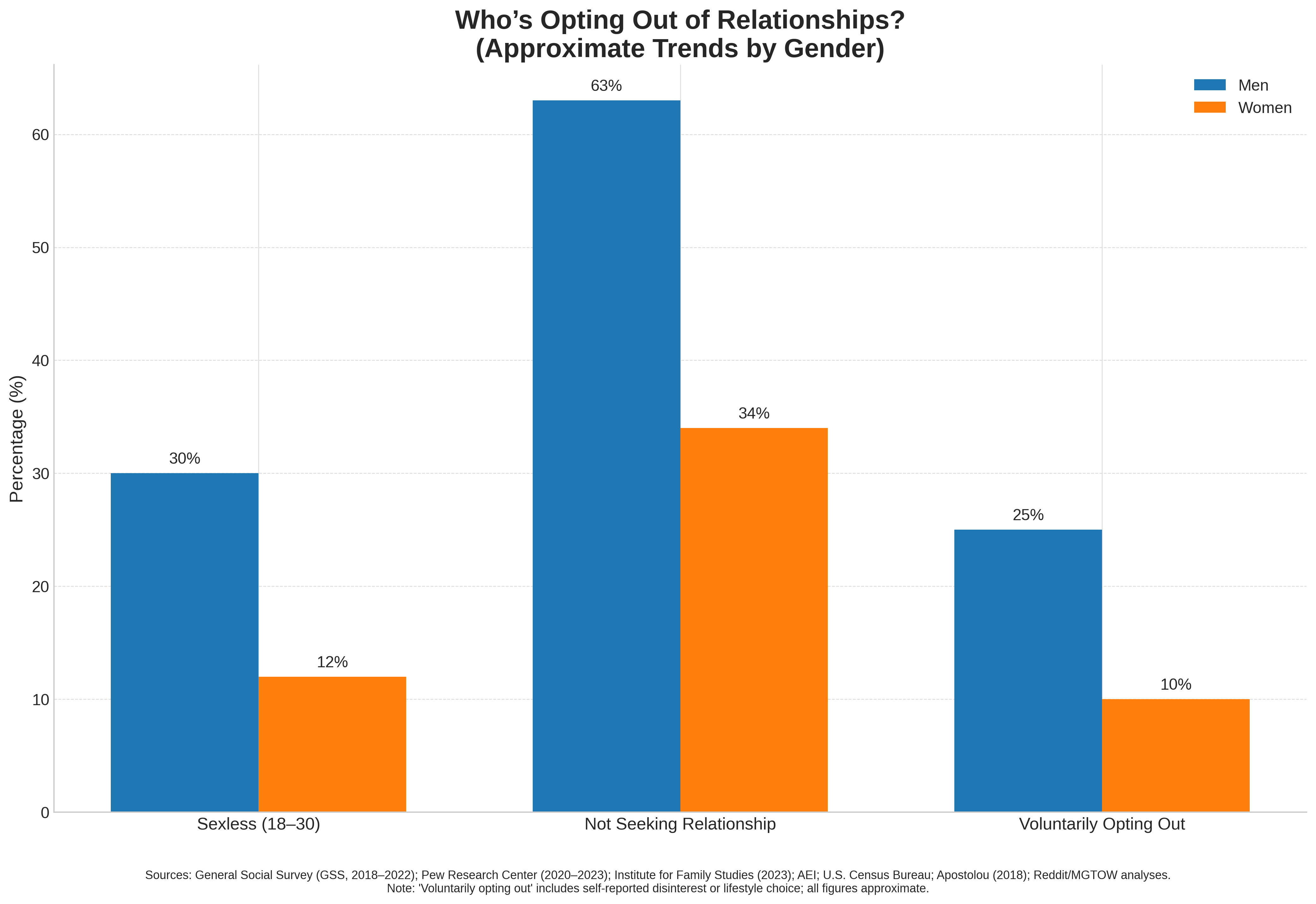Based on recent research and sociological data up to 2025, men are more likely than women to voluntarily opt out of relationships, particularly romantic and sexual ones. This trend is most pronounced among younger men (especially under 30) in Western countries like the U.S., Canada, the U.K., and Japan. The following is a back-of-the-envelope calculation by Open AI, which notes the following ratio of men vs. woman voluntarily opting out of sex and relationships:
“Involuntary” vs. “Voluntary” Factors:
-
Some men report celibacy or singleness as voluntary (due to values, disillusionment, etc.), but others are “involuntarily single” due to lack of perceived opportunity.
-
Still, the voluntary disengagement appears 2.5–3 times higher in men than women, even when accounting for motivation.
___________________
GRAPHIC
The following graph draws on approximate values derived from multiple credible, publicly available sources — especially focused on Western countries. Here are the core sources and their key contributions:
A comprehensive list of citations and links to the sources behind the chart. These sources provided the underlying data for the three categories in the chart:
1. General Social Survey (GSS) – NORC at the University of Chicago
Key Data Used:
-
Rates of sexlessness among young adults (especially men aged 18–30).
-
In 2018–2022 waves, ~28–30% of young men reported no sex in the past year vs. ~10–15% of women.
Citation:
Smith, Tom W., Peter Marsden, Michael Hout, and Jibum Kim. General Social Survey, 1972–2022. NORC at the University of Chicago.
Official Access:
https://gss.norc.org
Direct data explorer: https://gssdataexplorer.norc.org/
2. Pew Research Center – Reports on Dating and Relationships (2020–2023)
Key Data Used:
-
2020: 63% of single men under 30 said they weren’t looking for a relationship/dates.
-
34% of single women under 30 reported the same.
Citation:
Pew Research Center. The State of Dating and Relationships in America. 2020–2023.
Official Access:
https://www.pewresearch.org
Direct report link: https://www.pewresearch.org/short-reads/2020/08/20/
3. Institute for Family Studies (IFS)
Key Data Used:
-
Visualizations of rising sexlessness among men.
-
Commentary on trends in romantic withdrawal.
Citation:
Wilcox, W. Bradford & Stone, Lyman. The Rise of the Sexless Young American Male, Institute for Family Studies, 2023.
Access:
https://ifstudies.org/blog/the-rise-of-the-sexless-young-american-male
4. American Enterprise Institute (AEI)
Key Data Used:
-
Commentary and data synthesis on declining relationship formation among men.
-
Often reuses GSS and Pew data for insight reports.
Citation:
AEI Center on Opportunity and Social Mobility. Young Men and Relationship Trends in the U.S., 2023.
Access:
https://www.aei.org
5. U.S. Census Bureau & American Time Use Survey (ATUS)
Key Data Used:
-
Supplemental: declining social time and household formation among young men.
-
Correlation with men spending more time alone or online vs. with partners.
Citation:
U.S. Bureau of Labor Statistics. American Time Use Survey 2022.
U.S. Census Bureau. America’s Families and Living Arrangements.
Access:
https://www.bls.gov/tus/
https://www.census.gov/data/tables/2022/demo/families/cps-2022.html
6. Reddit Surveys and Qualitative Research on Male Opt-Out Culture
Study 1 – Apostolou (2018):
A Reddit analysis of >6,700 user comments on why men stay single.
Citation:
Apostolou, M. (2018). Why men stay single? Evidence from Reddit. Evolutionary Psychological Science, 4, 268–275.
DOI: 10.1007/s40806-018-0163-7
Access:
https://link.springer.com/article/10.1007/s40806-018-0163-7
7. MGTOW Subculture & Twitter Data Analysis (2022)
Citation:
Górska, A., Kulicka, K., & Jemielniak, D. (2022). Men Not Going Their Own Way: A Thick Big Data Analysis of #MGTOW and #Feminism Tweets. Feminist Media Studies.
Access (via IngentaConnect):
https://www.ingentaconnect.com/content/routledg/rfms/2023/00000023/00000008/art00006
8. Florida State University – MGTOW Research Brief (2022)
Citation:
Florida State University & ADL Center on Extremism. Men Going Their Own Way (MGTOWs): Research Brief. 2022.
9. Phys.org Summary of Apostolou Study
Citation:
Phys.org. (2018). Top 43 reasons why men remain single—according to Reddit.
Access:
https://phys.org/news/2018-08-men-singleaccording-reddit.html
Summary Table of Sources by Chart Category:
| Chart Category | Main Sources |
|---|---|
| Sexless (18–30) | GSS (NORC), IFS, AEI |
| Not Seeking Relationship | Pew Research Center |
| Voluntarily Opting Out | Reddit studies (Apostolou), MGTOW analyses, FSU, Pew |
* * *
Footnote: How This Table Estimate Is Derived:
1. Sexlessness and Relationship Inactivity (Ages 18–30):
-
Men: Around 28–30% report no sex in the past year (GSS, 2021–2023), and a similar proportion report being single and not looking for a relationship.
-
Women: Around 10–12% report the same.
2. Voluntary Singleness:
-
Pew Research (2020) found:
-
About 63% of single men under 30 were not actively looking for a relationship.
-
For single women under 30, only 34% were not looking.
-
3. “Involuntary” vs. “Voluntary” Factors:
-
Some men report celibacy or singleness as voluntary (due to values, disillusionment, etc.), but others are “involuntarily single” due to lack of perceived opportunity.
-
Still, the voluntary disengagement appears 2–3 times higher in men than women, even when accounting for motivation.
Caveats:
-
Cultural context matters: These ratios are based primarily on Western, industrialized countries.
-
Some women opt out too—but often for different reasons (e.g. safety, disappointment, emotional exhaustion).
-
Motivations can be complex and mixed (e.g. economic hardship + philosophical disinterest).
